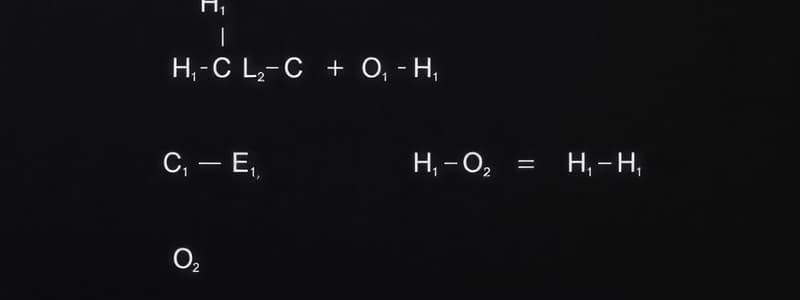Podcast
Questions and Answers
What does a molecular formula represent?
What does a molecular formula represent?
- The simplified ratio of atoms in a compound
- The exact number of atoms of each element in a molecule (correct)
- The total number of atoms in all compounds
- The average atomic weight of a molecule
Which formula represents the simplest whole-number ratio of the elements in a compound?
Which formula represents the simplest whole-number ratio of the elements in a compound?
- Empirical formula (correct)
- Molecular formula
- Chemical formula
- Structural formula
What is the empirical formula of glucose, C₆H₁₂O₆?
What is the empirical formula of glucose, C₆H₁₂O₆?
- CH₂O (correct)
- C₆H₁₂O₆
- C₂H₄O₂
- C₃H₆O₃
How can molecular formulas be determined?
How can molecular formulas be determined?
What is the total mass of the empirical formula unit CH₂O?
What is the total mass of the empirical formula unit CH₂O?
Why are molecular formulas important in biology?
Why are molecular formulas important in biology?
Which of the following statements is incorrect?
Which of the following statements is incorrect?
What distinguishes isomers from each other?
What distinguishes isomers from each other?
Why might empirical formulas be used instead of molecular formulas for large biological molecules?
Why might empirical formulas be used instead of molecular formulas for large biological molecules?
What can lead to incorrect empirical formulas when determining them experimentally?
What can lead to incorrect empirical formulas when determining them experimentally?
Which of the following statements regarding glucose and fructose is true?
Which of the following statements regarding glucose and fructose is true?
What is typically needed to fully understand the role of a molecule in a biological system?
What is typically needed to fully understand the role of a molecule in a biological system?
How is the molecular formula derived from the empirical formula?
How is the molecular formula derived from the empirical formula?
What information does the molecular formula C₆H₁₂O₆ provide?
What information does the molecular formula C₆H₁₂O₆ provide?
Why are molecular formulas particularly useful in biology?
Why are molecular formulas particularly useful in biology?
What is the main purpose of empirical formulas?
What is the main purpose of empirical formulas?
How do empirical formulas assist in analyzing biological macromolecules?
How do empirical formulas assist in analyzing biological macromolecules?
What is one limitation of using molecular and empirical formulas?
What is one limitation of using molecular and empirical formulas?
In what context are molecular formulas especially important in pharmacology?
In what context are molecular formulas especially important in pharmacology?
What process allows the determination of an empirical formula from percentage composition?
What process allows the determination of an empirical formula from percentage composition?
Which of the following molecules has the same molecular formula as glucose?
Which of the following molecules has the same molecular formula as glucose?
What indicates the molecular formula of aspirin?
What indicates the molecular formula of aspirin?
Flashcards are hidden until you start studying
Study Notes
Chemical Formulas
- Represent the composition of molecules and compounds
- Provide information about the types and numbers of atoms present in a substance
- Two common types are molecular formulas and empirical formulas
Molecular Formulas
- Show the exact number of atoms of each element in a molecule
- For example, the molecular formula for glucose is C₆H₁₂O₆, indicating 6 carbon atoms, 12 hydrogen atoms, and 6 oxygen atoms
- Can be determined from the molecular mass of a compound and its empirical formula
- Crucial in biology as they provide exact composition of biomolecules like carbohydrates, proteins, and nucleic acids
- Example: Glucose (C₆H₁₂O₆) is key in cellular respiration for providing energy to cells
- Molecular formulas help identify different molecules with the same empirical formula but different structures (e.g., glucose, fructose, and galactose have the same molecular formula but different structures)
Empirical Formulas
- Represent the simplest whole-number ratio of elements in a compound
- For glucose (C₆H₁₂O₆), the empirical formula is CH₂O, reflecting the ratio of carbon, hydrogen, and oxygen atoms
- Determined from the relative amounts of each element, usually in terms of percentage composition
- Useful when the exact molecular structure is unknown or dealing with complex molecules
- Example: Fatty acid C₁₆H₃₂O₂ indicates the ratio of carbon, hydrogen, and oxygen atoms
Similarities Between Molecular and Empirical Formulas
- Both describe composition of a compound in terms of elements present
- Both are derived from experimental data
Differences Between Molecular and Empirical Formulas
- Detail level: Molecular formulas are more detailed, showing the exact number of atoms of each element. Empirical formulas only provide the simplest ratio.
- Biological contexts: Molecular formulas are better for understanding the structures and functions of biological molecules, while empirical formulas are used for complex molecules or when only the basic composition is needed.
Biological Applications of Molecular and Empirical Formulas
- Metabolic pathways: Molecular formulas help understand the flow of energy and matter in metabolic pathways.
- Identifying unknown compounds: Empirical formulas provide insights into the basic composition of unknown compounds.
- Drug design and pharmacology: Molecular formulas are key in designing drugs by predicting drug interactions with biological molecules.
Limitations of Molecular and Empirical Formulas
- Complexity of biological molecules: Large and complex biomolecules like proteins and nucleic acids make it difficult to determine their molecular formulas.
- Isomerism: Isomers have the same molecular formula but different structures, presenting a challenge in identifying them.
- Determining empirical formulas from experimental data: Errors in experimental measurements can lead to incorrect empirical formulas.
Studying That Suits You
Use AI to generate personalized quizzes and flashcards to suit your learning preferences.



